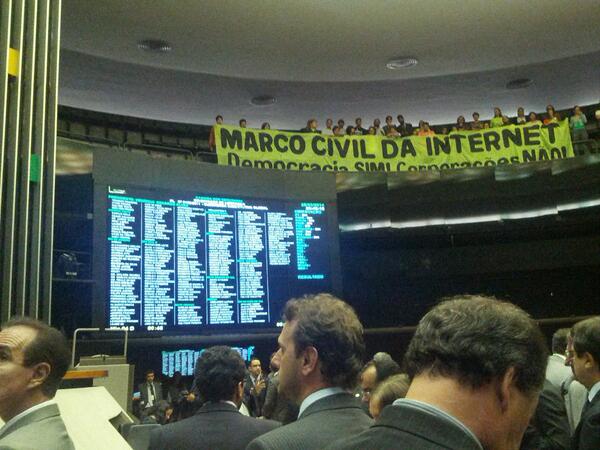Advox members Marianne Diaz and Sarah Myers are reporting live from the NETmundial global Internet governance meeting taking place from April 23-24 in Sao Paulo, Brazil. Civil society, corporate, and government representatives from around the world have gathered to debate the future of Internet governance in a post-Snowden world. This post is part of series of features on the event.
The Global Multistakeholder Meeting on the Future of Internet Governance opened its doors on Wednesday, April 23 in Sao Paulo, Brazil — at the eleventh hour, Brazil's Senate voted to pass the landmark Marco Civil da Internet, which was signed into law by President Dilma Rousseff in the early hours of the meeting on Wednesday. Considered the first “bill of rights” for the Internet in the world developed through a local multistakeholder approach to lawmaking, the Marco Civil places Brazil in a unique leadership role for global discussion and debate surrounding human rights and technology.
But activists are already pointing out that much of the language in the law was softened between the first and the second drafts of the bill — some feel that human rights protections have become diluted in the current text.

Brazil's Chamber of Deputies approved the Marco Civil in March 2014. Photo shared by Carolina Rossini via Twitter.
The version of Marco Civil passed on Tuesday by the Senate and subsequently signed into law by President Dilma Rousseff is said to contain provisions mandating data retention for content providers that could result in violations of personal privacy. Similarly, protections for network neutrality are not as strong as they were at one time during the bill's long legislative journey to passage. Concerns regarding the militarization of the cyberspace and the underrepresentation of some sectors of the society that might have been excluded from the meeting have also been raised.
In response to this discussion, a letter from civil society has been drafted and is open to signatures from the public, demanding that governments adopt strong legislation to protect citizen's freedoms and net neutrality, and that they “take effective measures to put technology back into citizens’ hands,” enabling universal access to online content and putting an end to the militarization of cyberspace through overly broad cybercrime-focused laws.
The NETmundial meeting aims to reach some level of global consensus around a multistakeholder model for Internet governance, in a moment that civil society groups see as critical to their cause. In the wake of the Snowden revelations, exposing government wrongdoing and double standards concerning the protection of freedoms and liberties in the Web, many civil society groups feel that its is time for them to collectively develop a consensus-driven model for Internet governance and a set of strong principles regarding human rights and the Internet.
Representatives from academia, civil society, the technical community and approximately 90 governments from all over the world have come to Sao Paulo for this event. Civil society has high aspirations for this meeting, but it is clear that the core issues in question cannot and will not be solved in a two-day meeting. Most agree the meeting should become only the beginning of a much broader discussion, and the place where mechanisms are created that allow for that conversation to represent and encompass the myriad perspectives, including those of Internet users themselves.



